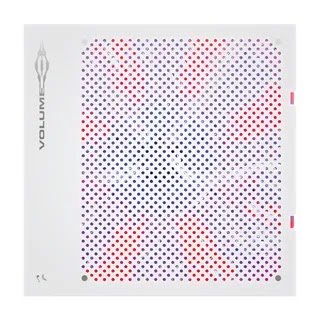Six years after Vol. 2, the latest label compilation obliterates the notion that there’s any one PC Music sound. It’s the work of producers interested in self-expression and the shifting grounds of pop music.
Despite PC Music’s high-concept visuals, shapeshifting production, and ambitious collaborations with multinational beverage corporations, the aims of the label are modest. For founder A. G. Cook, running the boundary-pushing record label has always been about releasing music that feels honest and intimate, first and foremost. He told Interview Magazine that when he makes tracks, it’s as if his computer is an extension of himself. “My brain is just operating on a different level,” he said. “[My computer] feels like a part of me.” Over the years, he’s made it clear that if he and his collaborators are making “personal computer music,” the emphasis is first and foremost on the “personal.”
PC Music Volume 3—a mix of new tracks and songs released since 2016’s Volume 2—is the first of the label’s compilations to fully deliver on that promise. In the label’s earliest days, it could feel like there was a house style of sorts—especially since Cook had his hands in so many of the label’s most memorable plasticine productions—but Volume 3 obliterates the notion that there’s any one PC Music sound. No matter the genre—from cyborg radio refractions to acid-burned rave memories—each track feels intensely detailed and emotionally rich, the work of producers as interested in self-expression as they are focused on shifting notions of what pop music can sound like.
In the case of some of the artists collected on Volume 3, that means edging ever closer to music that’d genuinely be fit for the Billboard charts. A. G. Cook’s “Xcxoplex,” for example, welcomes Charli XCX for a euphoric rework of one of his solo songs, and it sounds, in places, like the sort of euphoric EDM track that would have once soundtracked kids grinding their teeth at Electric Zoo. But Cook’s never been the sort of artist to embrace pure pleasure; the most ecstatic moments are cut with digital noise, rhythmic contortions, and pitch-shifted harmonies. Even as the timbre of pop music shifts toward more outré sounds—the head-spinning sonics of hyperpop, digicore, and plugg have emerged from the internet underground since the last PC Music compilation—Cook’s productions are still wonderfully jarring. Other dreamy efforts like caro♡’s “over u” and Namasenda’s “☆” (which features French singer-producer Oklou) are a little less complicated. This approach can be a virtue for pop music, but some of these moments feel a bit weightless in the context of a PC Music compilation that’s full of complex, rich takes on otherwise recognizable.
Still, other familiar faces from the PC Music catalog show up to turn in some of their most memorable melodies. Hannah Diamond offers up a hyperreal love song on “Invisible.” Felicita teams with Caroline Polachek for the dramatic piano ballad “marzipan.” Danny L Harle offers a dreamy dance track with Clairo on “Blue Angel.” Many of these tracks were previously released, so Volume 3 feels a little like a Greatest Hits of the last half-decade of PC Music—a celebration of how far they’ve come since their last compilation. They’re working with stars now, but they still feel like pop iconoclasts, pushing their collaborators to try out new and strange sounds.
They’ve established the outer limits of pop and dance music over the better part of the last decade, and they still sound at their best when they’re diving into the unknown. A pair of tracks from the Brooklyn-based producer umru represent some of the compilation’s most futuristic sounds. “Check1,” featuring Tommy Cash and glitch-rap mutant 645AR, is powered by a menacing yet minimal beat that sounds like a UK drill track caved in upon itself. “Popular,” a 2018 single featuring 100 gecs’ Laura Les, is full of warped electronics and smeared technicolor melodies. But unlike a lot of digitalist pop released in its wake, it’s focused and straightforward, clearly the work of a producer who understands careful songcraft, yet decided to disregard it altogether.
It’s in these moments that PC Music Volume 3 feels the most singular. When Lil Data torches the edges of acid techno on “Burnnn” or when Planet 1999 sends shoegaze beyond the stratosphere on “Party,” there’s a sense that PC Music aren’t done yet. Even as some of the label’s efforts edge closer to the mainstream, there will always be room on PC Music for producers who want to uncover new worlds altogether.









%20Music%20Album%20Reviews.webp)






0 comments:
Post a Comment